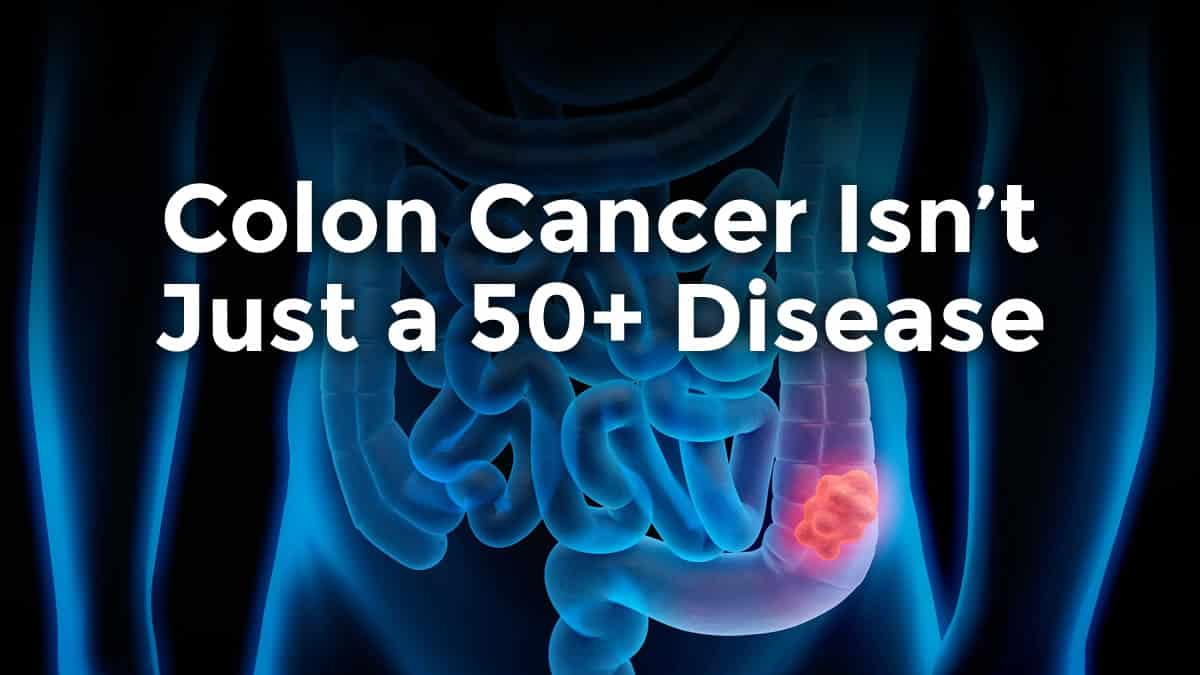You may think of colon cancer as a disease that affects older adults. This is not always the case. There is a growing problem of colon cancer in young adults. The media recently shined a light on this problem after the death of actor Chadwick Boseman from colon cancer at age 43.
Colon cancer is a leading cause of death throughout the world. Young adults are not immune to this deadly cancer.
Throughout my career thus far, I have unfortunately diagnosed colorectal cancer in many young adults. Many of them had been having symptoms but were not sure what to make of them. It is important to shed light on this topic and get people thinking and talking about the importance of early diagnosis and treatment. When colon cancer is diagnosed early, it can be beaten.
This article will discuss the increasing trend of colon cancer in young adults. I’ll first highlight colon cancer statistics and the potential causes of colon cancer in young adults. I’ll then explore how you can reduce your risk by modifying colon cancer risk factors. Lastly, I’ll discuss colon cancer symptoms, so you know when to see a gastroenterologist.

Colon Cancer Statistics for Young Adults
Studies show an alarming change in colon cancer statistics for young adults. According to the American Cancer Society, the rate of colon cancer in young adults grew by 2% each year from 2007 to 2016. Sadly, colon cancer in young adults tends to be more aggressive than colon cancer later in life. This results in a worse prognosis for young adults with colon cancer.
The number of deaths from colon cancer has dropped due to better screening awareness and improvements in treatment. However, more young adults are dying from colon cancer than ever before. Colon cancer deaths in young adults grew by 1% per year from 2008 to 2017.
The current colon cancer screening guidelines recommended a screening colonoscopy beginning at age 45 for healthy adults. But they do not recommend screening for young adults unless they have a family history or genetic risk. This can reduce the chances of detecting colon cancer in young adults who don’t have a known increased risk.
This dilemma highlights the need for a better understanding of what causes colon cancer in young adults.
What Causes Colon Cancer in Young Adults?
Unfortunately, we don’t yet know what’s responsible for the jump in colon cancer cases in young adults. We suspect that unhealthy lifestyle choices may play a role. We’ll discuss colon cancer risk factors that may contribute to colon cancer’s rising rates in young adults.
Obesity & Excess Weight
Obesity is a leading cause of health problems worldwide. And this includes your risk for colon cancer. If you are obese, you are 30% more likely to develop colon cancer than someone with a healthy weight.
Weight gain negatively affects your health by increasing:
- Inflammation
- Insulin levels
- Oxidative stress
This results in an altered immune response that may lead to cellular mutations in the colon. High waist circumference increases the prevalence of colon polyps. Colon polyps are precancerous growths that have the potential to develop into cancer.
Maintaining a healthy weight and low waist circumference may reduce your risk of colon cancer. You can achieve a healthy weight by getting regular physical activity and eating a healthy diet.
Sedentary Lifestyle
A sedentary lifestyle also puts you at a higher risk for colon cancer. Research shows that prolonged passive TV viewing increases the risk of colorectal cancer in young adults.
This may be due to factors associated with a sedentary lifestyle, including:
- Obesity
- Unhealthy diet
- Low levels of vitamin D
- Imbalance of microorganisms in the colon (gut dysbiosis)
- Lower energy use
- Higher caloric intake
- Extended exposure to fecal carcinogens (constipation)
- High insulin levels
Improving your activity level can reduce your risk of colon cancer by mitigating some of the above factors. Regular physical activity can improve:
- Blood flow
- Muscle contraction
- Insulin levels
- Endothelial function
- Frequency of bowel movements
- Weight loss
Unhealthy Diet
A diet high in red meat and processed foods may increase your risk of colon cancer. Your colon maintains a balance of microorganisms that prevent disease. But an unhealthy diet can disrupt this balance.
Most importantly, you can improve your gut health by eating a plant-based diet. A plant-based diet focuses on whole foods that come from plant sources such as:
- Fruits
- Vegetables
- Whole grains
- Legumes
- Nuts and seeds
Processed foods are everywhere. But avoiding these foods and choosing more whole, plant-based foods instead can improve your gut health. This is because plant-based foods are rich in fiber, vitamins, and minerals.
Avoiding processed foods and eating healthy promotes the growth of healthy bacteria in your colon. And this can keep you healthy longer.
Smoking
Smoking significantly increases your risk of colon cancer. And it also increases your risk of dying from colon cancer. Research shows that smokers are more likely to die from colon cancer than non-smokers.
Tobacco smoke contains at least 70 chemicals that cause cancer. Some of the carcinogens in tobacco smoke are:
- Nicotine
- Hydrogen cyanide
- Formaldehyde
- Lead
- Benzene
- Tar
- Arsenic
- Ammonia
- Carbon monoxide
Cigar smoke, smokeless tobacco, and e-cigarettes also contain high levels of carcinogens that can lead to colon cancer.
Inhaling these carcinogens during smoking increases the prevalence of colon polyps. And these polyps have the potential to turn deadly.
If you smoke, the best way to reduce your risk of colon cancer is to quit smoking. Quitting smoking is a difficult challenge, but it can extend your life. You can find helpful resources for smoking cessation here.
Alcohol Consumption
While alcohol is a beverage enjoyed by many young adults, drinking too much of it may lead to the development of colon cancer. Research shows that moderate to heavy alcohol consumption increases colon cancer risk.
The digestion and metabolism of alcohol can cause damage to your gut health. Alcohol consumption can increase the rate of colon cancer by:
- Metabolizing alcohol into toxic chemicals
- Producing reactive oxygen species
- Impairing nutrient absorption
- Compromising your immune system
You Can Change Colon Cancer Risk Factors
The increasing rate of colon cancer in young adults is concerning. While we don’t yet know what causes this, you can reduce colon cancer risk factors by making healthy lifestyle choices. In these uncertain times, now is the time to prioritize your health.
You can minimize colon cancer risk factors by:
- Maintaining a healthy weight
- Getting regular exercise
- Eating a healthy diet
- Quitting smoking
- Avoiding alcohol or drinking only small amounts
You can also decrease your risk by understanding colon cancer symptoms and knowing when it is important to see a gastroenterologist.
When to See a Gastroenterologist in Plano, TX
Colon cancer may not cause any symptoms in the early stages of the disease. Symptoms of colon cancer usually appear later. You should contact your doctor if you notice changes in your bowel health.
Symptoms of colon cancer may include:
- Abdominal pain
- Bloating
- Blood in the stool
- Rectal bleeding
- Change in bowel movements
- Diarrhea
- Constipation
- Thin stools
- Lump in the abdomen
- Weakness or fatigue
- Weight loss
If you experience any of the above symptoms, don’t wait to get medical attention.You should contact your doctor as soon as possible. It’s crucial to evaluate the cause of your symptoms. If you receive a diagnosis of colon cancer, you have the advantage of starting treatment early to prevent it from growing or spreading.
Because colon cancer in young adults is generally a more aggressive form of cancer, catching it as soon as possible can save your life.
If you have concerns about colon cancer in Plano, TX, you can make an appointment online or call my office at 972-867-0019.

